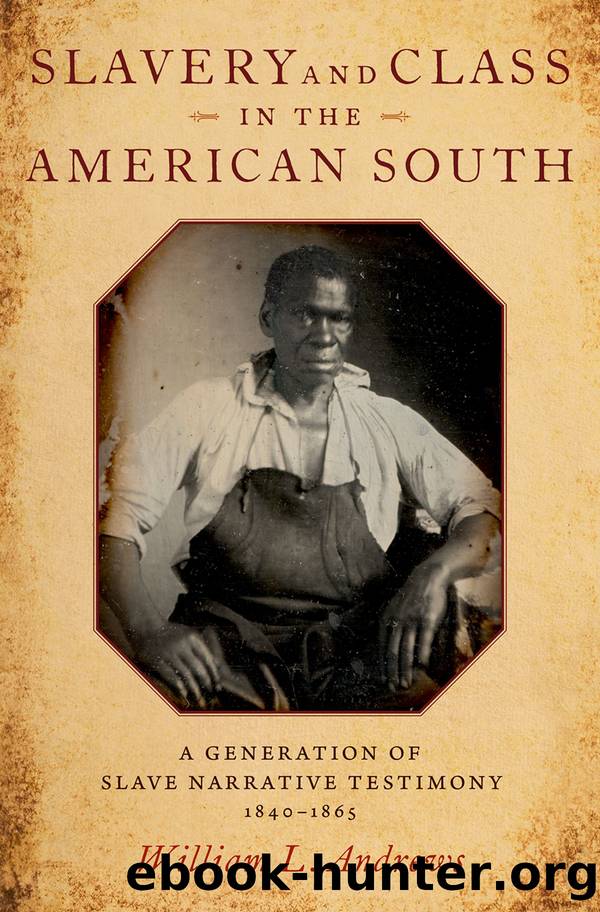Slavery and Class in the American South by William L. Andrews

Author:William L. Andrews
Language: eng
Format: epub
Publisher: Oxford University Press
Published: 2019-08-15T00:00:00+00:00
Josiah Henson: The Conflicted Conscience of a Confidential Slave
Somewhere in the process of his elevation from farm superintendent to “factotum,” Josiah Henson became, for all practical purposes, the confidential slave of Isaac Riley. That a driver, foreman, or head man could also be rewarded with the status of confidential slave seems to have been a common practice in the antebellum South. Frederick Law Olmsted remembered an elite South Carolina slave who served in a capacity similar to Henson’s and was called by his master “the watchman,” a variant of Randolph’s “watch-dog” term for a confidential slave. The watchman “had charge of all the stores of provisions, tools, and materials of the plantations, as well as of all their produce, before it was shipped to market.” This “gentlemanly-mannered mulatto” was superior in authority to the overseer, who “received his allowance of family provisions from the watchman, as did also the head-servant at the mansion, who was his brother. His responsibility was much greater than that of the overseer; and [the planter] said, he would trust him with much more than he would any overseer he had ever known.”91
According to The Rev. J. W. Loguen, as a Slave and as a Freeman, when Manasseth Logue installed Jermain Loguen as “head man of the plantation,” he named his enslaved mixed-race nephew his “confidential servant” too (226). The preface to The Narrative of James Williams identifies the narrator as “a favorite servant in an aristocratic family in Virginia, and afterwards as the sole and confidential driver on a large plantation in Alabama.”92 Henson’s elevation to elite status on his enslaver’s farm made no specific reference to “confidential servant” status, but the details of his advancement under Riley attest to how greatly Riley confided in his foreman materially, financially, even emotionally. Loguen stressed that though “eminently fitted to the trust” his master placed in him, the “confidential servant and head man of the plantation” used his position simply “as a means to an end. Under cover of it, he was plotting to run away” (The Rev. J.W. Loguen, 227). Henson, by contrast, seems to have found a similar appointment gratifying for its own sake.93
Henson’s conflicted relationship to Riley is one of the most intriguing aspects of his two antebellum autobiographies. In his 1849 Life, Henson introduced Riley as an “apt illustration” of all that was wrong with slaveholding. Riley was a typically mean master, “coarse and vulgar in his habits, unprincipled and cruel in his general deportment, and especially addicted to the vice of licentiousness” (5). Henson’s first impression of Riley occurred when he violently kicked Henson’s kneeling mother as she beseeched him to purchase her sickly five-year-old son along with herself. To some slaves the “bitterness” of such memories would be “dark enough to overshadow the whole after-life with something blacker than a funeral pall” (4). But as Henson grew up, his feelings about Riley changed.
The “robust and vigorous” field worker welcomed praise from his master as well as his fellow slaves when they foresaw “the great things I should do when I became a man” (Life, 7).
Download
This site does not store any files on its server. We only index and link to content provided by other sites. Please contact the content providers to delete copyright contents if any and email us, we'll remove relevant links or contents immediately.
| General | Discrimination & Racism |
Nudge - Improving Decisions about Health, Wealth, and Happiness by Thaler Sunstein(6634)
iGen by Jean M. Twenge(4702)
The Fire Next Time by James Baldwin(4343)
Adulting by Kelly Williams Brown(3671)
The Sports Rules Book by Human Kinetics(3588)
The Hacking of the American Mind by Robert H. Lustig(3580)
The Ethical Slut by Janet W. Hardy(3504)
Captivate by Vanessa Van Edwards(3298)
Mummy Knew by Lisa James(3168)
In a Sunburned Country by Bill Bryson(2948)
Ants Among Elephants by Sujatha Gidla(2925)
The Worm at the Core by Sheldon Solomon(2918)
Suicide: A Study in Sociology by Emile Durkheim(2610)
The Slow Fix: Solve Problems, Work Smarter, and Live Better In a World Addicted to Speed by Carl Honore(2574)
Humans of New York by Brandon Stanton(2379)
Handbook of Forensic Sociology and Psychology by Stephen J. Morewitz & Mark L. Goldstein(2377)
Blackwell Companion to Sociology, The by Judith R. Blau(2319)
The Happy Hooker by Xaviera Hollander(2274)
Outliers by Malcolm Gladwell(2258)
